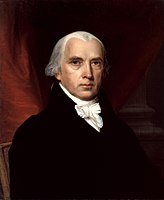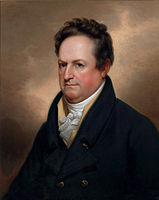1812 United States presidential election in Pennsylvania
(Redirected from United States presidential election in Pennsylvania, 1812)
The 1812 United States presidential election in Pennsylvania took place as part of the 1812 United States presidential election. Voters chose 25 representatives, or electors to the Electoral College,[1] who voted for President and Vice President.
| |||||||||||||||||||||||||||||
| |||||||||||||||||||||||||||||

| |||||||||||||||||||||||||||||
| |||||||||||||||||||||||||||||
Pennsylvania voted for the Democratic-Republican candidate, James Madison, over the Federalist candidate, DeWitt Clinton. Madison won Pennsylvania by a margin of 25.2%.
Results
edit| 1812 United States presidential election in Pennsylvania[2] | |||||
|---|---|---|---|---|---|
| Party | Candidate | Votes | Percentage | Electoral votes | |
| Democratic-Republican | James Madison (incumbent) | 48,816 | 62.60% | 25 | |
| Federalist | DeWitt Clinton | 29,162 | 37.40% | 0 | |
| Totals | 77,978 | 100.0% | 25 | ||
Note: Election results totals only include known numbers, as verified by the source. Vote totals from several counties are missing/unknown.
County results
edit| County | James Madison
Democratic-Republican |
DeWitt Clinton
Federalist |
Total votes cast | ||
|---|---|---|---|---|---|
| % | # | % | # | ||
| Adams | 35.47% | 410 | 64.53% | 746 | 1,156 |
| Allegheny | 59.96% | 966 | 40.04% | 645 | 1,611 |
| Armstrong | 70.35% | 121 | 29.65% | 51 | 172 |
| Beaver[3] | 62.37% | 383 | 37.62% | 231 | 614 |
| Bedford | 56.20% | 721 | 43.80% | 562 | 1,283 |
| Berks | 81.36% | 3,025 | 18.64% | 693 | 3,718 |
| Bucks | 49.03% | 2,184 | 50.97% | 2,270 | 4,454 |
| Butler | 79.96% | 375 | 20.04% | 94 | 469 |
| Cambria | 64.03% | 89 | 35.97% | 50 | 139 |
| Centre | 85.33% | 1,239 | 14.67% | 213 | 1,452 |
| Chester | 47.28% | 2,788 | 52.72% | 3,109 | 5,897 |
| Crawford | 74.64% | 2,455 | 25.36% | 834 | 3,289 |
| Cumberland | 63.29% | 269 | 36.71% | 156 | 425 |
| Dauphin | 77.10% | 1,842 | 22.90% | 547 | 2,389 |
| Dauphin (late return) | 95.56% | 86 | 4.44% | 4 | 90 |
| Delaware | 32.58% | 592 | 67.42% | 1,225 | 1,817 |
| Erie | 54.09% | 152 | 45.91% | 129 | 281 |
| Fayette | 83.60% | 999 | 16.40% | 196 | 1,195 |
| Franklin | 66.89% | 1,513 | 33.11% | 749 | 2,262 |
| Greene | 64.98% | 425 | 35.02% | 229 | 654 |
| Huntingdon | 51.11% | 712 | 48.89% | 681 | 1,393 |
| Indiana[3] | 62.27% | 137 | 37.73% | 83 | 220 |
| Lancaster | 39.32% | 2,438 | 60.68% | 3,762 | 6,200 |
| Lehigh | 82.53% | 1,039 | 17.47% | 220 | 1,259 |
| Luzerne | 36.41% | 713 | 63.59% | 1,245 | 1,958 |
| Lycoming | 72.38% | 933 | 27.62% | 356 | 1,289 |
| Mercer | 79.27% | 367 | 20.73% | 96 | 463 |
| Mifflin | 89.54% | 1,053 | 10.46% | 123 | 1,176 |
| Montgomery | 59.12% | 2,623 | 40.88% | 1,814 | 4,437 |
| Northampton | 80.10% | 1,554 | 19.90% | 386 | 1,940 |
| Northumberland | 85.14% | 3,415 | 14.86% | 596 | 4,011 |
| Philadelphia | 60.11% | 6,987 | 39.89% | 4,637 | 11,624 |
| Susquehanna | 82.76% | 725 | 17.24% | 151 | 876 |
| Somerset | 71.89% | 422 | 28.11% | 165 | 587 |
| Venango & Warren | 78.44% | 131 | 21.56% | 36 | 167 |
| Washington | 84.57% | 2,334 | 15.43% | 426 | 2,760 |
| Wayne | 74.44% | 297 | 25.56% | 102 | 399 |
| Westmoreland | 63.96% | 818 | 36.04% | 461 | 1,279 |
| York | 59.77% | 2,090 | 40.23% | 1,407 | 3,497 |
| Source: [2] | |||||
See also
editNotes
edit- ^ While commonly labeled as the Federalist candidate, Clinton technically ran as a Democratic-Republican and was not nominated by the Federalist party itself, the latter simply deciding not to field a candidate. This did not prevent endorsements from state Federalist parties (such as in Pennsylvania), but he received the endorsement from the New York state Democratic-Republicans as well.
References
edit- ^ "1812 ELECTION FOR THE SEVENTH TERM, 1813-1817". National Archives. Retrieved August 4, 2012.
- ^ a b "Pennsylvania Presidential Election Returns 1812". Wilkes University. Retrieved August 4, 2012.
- ^ a b "Presidential Results: Pennsylvania, 1812". Vote Archive. Retrieved May 29, 2023.

